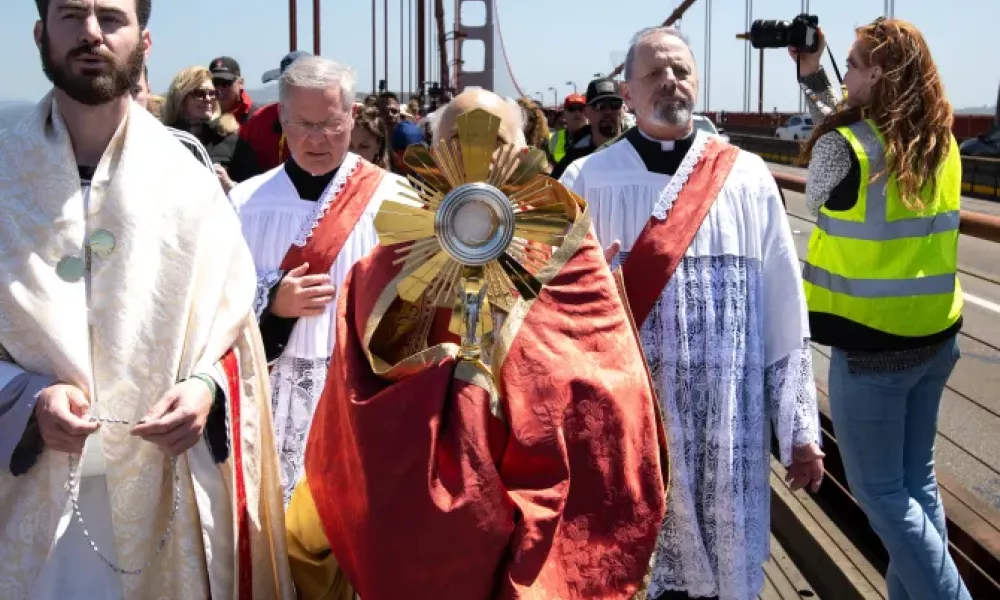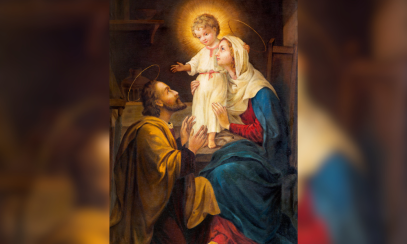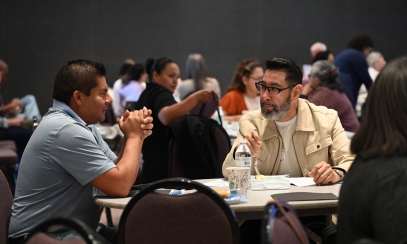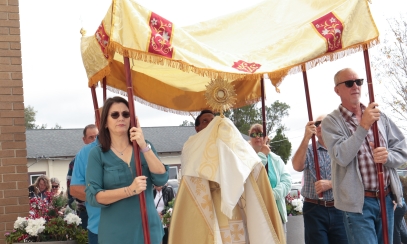
A Look at the Beginning of the Four National Eucharistic Pilgrimage Routes
This past weekend saw the launch of the four legs of the National Eucharistic Pilgrimage, an unprecedented effort to walk with the Eucharist thousands of miles across the United States as a public witness to the Church’s teaching that the Eucharist is truly the body of Jesus Christ.
This past weekend saw the launch of the four legs of the National Eucharistic Pilgrimage, an unprecedented effort to walk with the Eucharist thousands of miles across the United States as a public witness to the Church’s teaching that the Eucharist is truly the body of Jesus Christ.
Catholics on four edges of the country — San Francisco, southern Texas, northern Minnesota, and Connecticut — took part in the celebrations to accompany the Eucharist as well as two dozen young pilgrims on their two-month journeys, which will culminate at the National Eucharistic Congress in Indianapolis July 17–21.

The National Eucharistic Pilgrimage is accompanying Jesus from city to city, lighting hearts on fire along the way. | Photo by EWTN News Nightly/Screenshot
From the North — The Marian Route
On Pentecost Sunday, an outdoor Mass at Itasca State Park in northern Minnesota brought a large crowd of some 2,000 people to celebrate their love for the Eucharist. Bishop Andrew Cozzens blessed the Marian Route pilgrims at the headwaters of the Mississippi River as they began their journey thousands of miles to the National Eucharistic Congress in Indianapolis.

Bishop Andrew Cozzens of Crookston, Minnesota, blesses the crowd with the Eucharist in a monstrance during an outdoor Pentecost Sunday Mass on May 19, 2024, in Bemidji, Minnesota. The Mass at the headwaters of the Mississippi River marked the start of the National Eucharistic Pilgrimage, a four-route trek consisting of Eucharistic processions, community service and other events that culminates in July at the National Eucharistic Congress in Indianpolis, Indiana. | Photo by Gianna Bonello/CNA
From the West — The Junipero Serra Route
The longest and arguably the most challenging of the four routes, the Junipero Serra Route, began in San Francisco. Following Pentecost Mass at the Cathedral of St. Mary of the Assumption celebrated by Archbishop Salvatore Cordileone, the faithful processed with the Eucharist over the Golden Gate Bridge’s iconic 1.7-mile span.

The pilgrimage winds its way through the streets of San Francisco. | Photo by Jeffrey Bruno
From the South — The Juan Diego Route
In the Diocese of Brownsville, Texas, Bishop Daniel Flores celebrated Mass at Immaculate Conception Cathedral before pilgrims started on their journey amid 90-degree heat. The Juan Diego Route attracted many participants and has already included numerous stops for Eucharistic adoration in Brownsville, with the next major stop being Corpus Christi, the city named after the body of Christ.

The Juan Diego Route began in Texas, winding its way through the Rio Grande Valley. | Photo by EWTN News Nightly/Screenshot
From the East — The Seton Route
The faithful began in New Haven, Connecticut, with a Pentecost Vigil Mass celebrated by Archbishop Christopher Coyne at St. Mary’s Church, the resting place of Blessed Michael McGivney, the founder of the Knights of Columbus. On Sunday morning, the procession culminated in a boat ride across the Long Island Sound, with chaplain Father Roger Landry keeping the Eucharist secure within the monstrance.
View the entire roundup below from the EWTN News team.



